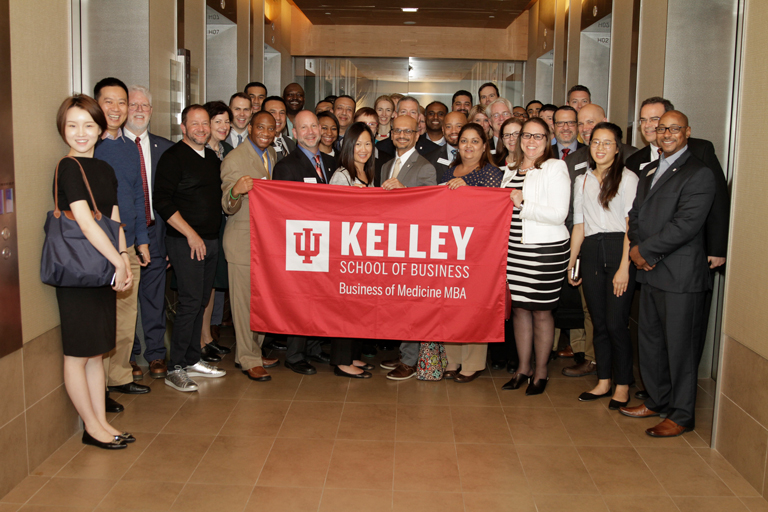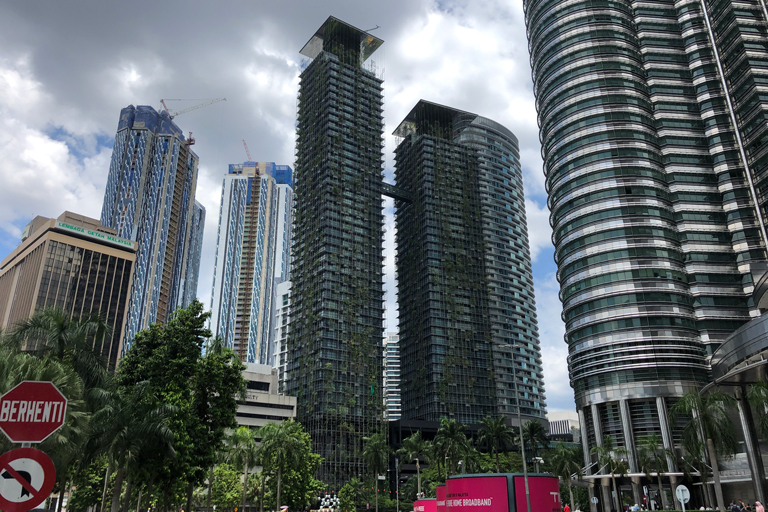Kelley School Physician MBAs in Singapore and Malaysia: An immersive healthcare experience
Tom Schleeter, MD, MBA’21, has seen firsthand how difficult it can be to be a patient.
His daughter, Sarah, was born with multiple disabilities, and Dr. Schleeter says while Sarah received outstanding care, dealing with insurance companies and other entities within the healthcare system was incredibly frustrating.
“That experience made me want to deliver better care. But I simply didn’t have the toolbox, or the means necessary, to advance the changes in care that we need. That’s why I pursued the Kelley Physician MBA, so I can help others in recreating a better healthcare system for all of us.”
Part of Dr. Schleeter’s first year in the Physician MBA Program included the
Global Healthcare Experience course, which takes doctors overseas to study international healthcare systems. The immersion experience is designed to give physicians an up-close look at healthcare across the globe, so they can compare and contrast—bringing home not only knowledge about different systems, but also new delivery methods and ideas that could work here at home. While the physician MBAs travel to different countries each year, Dr. Schleeter studied in Singapore and Malaysia.

“The healthcare system in the U.S. is very complex. We have a set of challenges we are actively addressing and trying to wrap our heads around,” said Nir Menachemi, professor and chair of health policy and management in the Richard M. Fairbanks School of Public Health. Menachemi also teaches in the Kelley Physician MBA Program and traveled with Dr. Schleeter and 29 other physician MBAs.
“Countries all over the world have had similar challenges, and some countries have addressed aspects of these challenges in ways we haven’t even considered fully in the U.S.,” continued Menachemi. “Sometimes just by visiting a country and learning about its healthcare system and the successful solutions in that system, our physicians can generalize opportunities for their own healthcare systems back home.”

“If we’re going to change healthcare, the answer is already out there,” said Dr. Schleeter. “We don’t need to reinvent the wheel. We need to find places that have already invented a good wheel – or a good part of the wheel. Singapore and Malaysia have very different healthcare systems, but each country does some things very well that we struggle with in the U.S.”
“For someone eager to effect healthcare change, it’s invaluable to be able to talk to executives and physicians of multiple hospitals in these two countries. We asked: ‘What works? What doesn’t? What can we do with what we’ve learned here?’ Those are rubber meets the road questions, and we were able to take away so much from each interaction and facility tour,” added Dr. Schleeter.
It takes more than 20 hours in planes to get there—more than 9,500 miles from Indianapolis. Singapore and Malaysia lie on the other side of the world, and their healthcare systems, though different than ours in the United States, provide a window into a new way of doing things.
The physician MBAs visit with top administrators and physicians at multiple hospitals, asking questions and developing a dialogue about what works and what doesn’t in both Singapore and Malaysia. The group traveled to speak with the Ministry of Health of Singapore and with leaders at Singapore General Hospital, Raffles Hospital, the Malaysia Healthcare Travel Council and Singapore’s Medical Association. They were able to tour many hospitals, examining specific departments. At one Singapore hospital, they visited the gastrointestinal (GI) suite, walking through, from start to finish, how a patient moves through the facility.
“When we’re asked to redesign the GI suite or interventional radiology suite or surgery suite, we can think about what we saw during this study trip and what parts were done well,” said Carla Fisher, MD, MBA’20. “These global conversations change things completely for us. As much as we try to look at the big picture, we practice in the U.S. This is the first time for many of us to see how healthcare is done elsewhere.”
“Nothing compares to listening to a chief healthcare decision-maker in another country, someone who tells our physicians what the challenges and issues really are. We experienced that not once, not twice but the entire week we were abroad,” explained Menachemi.
“The week is filled with enlightening interactions among thought-leaders, decision-makers, physicians and political leaders, and they are equally eager to learn from us and our physician MBAs. This creates a bidirectional relationship that lasts long after we leave the country. “

“The interactions with top-level administrators is everything,” said Aditya Ahlawat, MD, MBA’20. “To get a top-down understanding of how the healthcare system works in Singapore—from the public health level to how a hospital functions—you have to understand processes. You have to understand how they think about it from an administrative level, from a business standpoint. Based on those concepts and philosophy, you can really learn a lot about how medicine is practiced.
“The only way we can scratch the surface on how to improve or ameliorate our position is to get out there and see how other folks are doing it,” continued Dr. Ahlawat. “This experience has given me the ability, with broader perspective, to deeply think about how I could put parts of this into practice. We’re given the business acumen and tools in the Kelley Physician MBA to effect change, but sometimes, it’s difficult to see the forest through the trees. This experience really allows you to walk through the brush a little bit.”
Smaller than Indianapolis, Singapore operates a tiered healthcare system with public and private options.
“Singapore and Malaysia are essentially a trip through the history of the American healthcare system. They’re really, in many ways, where we were 20 to 30 years ago, but they’re doing some things better than we did,” said Sara Jo Grethlein, MD, MBA’20. “The application of electronic heath records is significantly different, for example. Investigating medical tourism, understanding their bundled pricing, discovering how to unpack healthcare costs and examining time-based accounting have been important to me.”

“Through conversations in Singapore, I have a much better understanding of the healthcare system at home,” said Dr. Grethlein. “Specifically, I was struck by their patient flow through a high-volume clinical setting. I texted colleagues in the U.S. that we need to see if it can be applied to a new center we’re developing at home.”
“The Physician MBA Program has been one of the most transformative things I’ve done,” said Samuel Williams III, MD, MBA’19. “This trip has given me a deeper understanding of not only strategies, but also how to look at things more critically.”
Part of the unexpected lessons learned came from spending time with physician peers, including the camaraderie formed by traveling together and the rich insight achieved from discussing best practices.
“You just can’t learn this in a classroom,” said Dr. Schleeter. “Hearing others ask insightful questions is so impactful.”
“To have several of our Physician MBA professors come along on the trip has been invaluable,” said Dr. Grethlein. “To talk about concepts with them and to see our experiences through their eyes has been eye-opening. It was very powerful to have their help reflecting on each visit.”

In each hospital visit, the physician MBAs discovered how culture in Singapore and Malaysia influences business, management and innovation.
“Every country’s healthcare system is, to some degree, a reflection of their values and their culture. It is difficult to understand how healthcare works without immersing yourself in that culture: Eating their foods, understanding their art and learning how people spend leisure time. How do markets work there, and what is shopping like? It’s a critical learning piece to understanding why and how their healthcare system works,” said Menachemi.
“If you can understand how other cultures assimilate and integrate their medical systems while still being true to their cultures, I think that’s tantamount to really understanding how we can improve our system,” said Dr. Ahlawat.
“Because the world is a global village, it’s important to step outside of your comfort zone—to see what other people are doing and to use those learning opportunities,” said Dr. Williams.

“I don’t ever want to be complacent in what I know or satisfied in my skill set. I want to be growing. I want to be exploring. I have so much great opportunity ahead of me, and it’s very clear the Kelley Physician MBA Program is supporting me in that. My world is broadened by being here,” said Dr. Grethlein.
“When these physician MBAs look back on their time in the program with us, the most vivid memories I expect them to have are the experiences from the global health trips. This is where you get insight about your own practice, your own healthcare system and your own country,” said Menachemi.
For Dr. Schleeter, it’s a pivotal part of his Physician MBA experience.
“I grew as a person in just the week I was there,” he said. “This experience changed my life, and I hope I can use it to change the lives of many others here at home.”
By: Teresa Mackin, tmackin@iu.edu
Leave a Reply